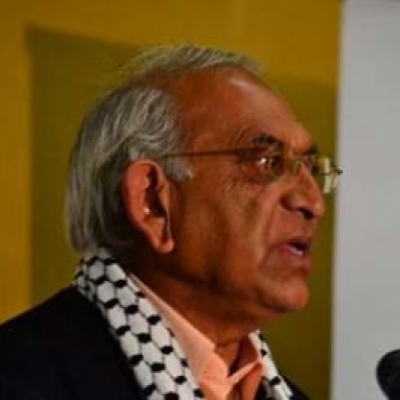 Iqbal Jassat
Iqbal Jassat
Has US President Donald Trump handed Turkish President Recep Tayyib Erdogan a poisoned chalice in Syria?
This is the view of a well known and highly respected analyst, Abdel Bari Atwan. His comments published before the latest reports of a ceasefire, make for interesting reading.
While most of the international mainstream media are gripped with a need to explain and make sense of the framework governing the implementation of the 120-hour ceasefire, Atwan's pre-ceasefire observations are thought provoking.
Following Trump’s abrupt announcement declaring withdrawal of American troops from North Syria, Turkey commenced a military invasion of the area. Erdogan claimed his aim is to crush the mainly Kurdish Syrian Democratic Forces (SDF) who control the region and whom he deems to be terrorists.
His objectives, which in the wake of the ceasefire, have become a source of confusion and controversy, include the establishment of a 30 by 500 km buffer zone inside the Syrian border and the resettling of some of the 3.5 million Syrian refugees currently in Turkey.
Atwan suggests that the risky gamble by Erdogan may result in an opposite result to what he intends. He speculates that Trump’s “gift” to Turkey, i.e. US abandonment of the Kurds, could be a trap that may end up resembling the one into which the Saudis were drawn in Yemen. Or, what the US experienced in Afghanistan and Iraq.
Atwan warns that in the SDF, Turkish troops will be confronting a well-armed and trained and highly motivated and battle-hardened force.
“The US has lavished sophisticated military equipment and expert training on the Kurdish militia over the years. It gained invaluable combat experience in its ferocious and bloody US-backed war on the Islamic State group (Daesh), which resulted in the destruction of its Caliphate state, its expulsion from its stronghold in Raqqa, and the capture of thousands of its fighters and supporters.”
In other words, Turkey’s invasion is not a walk in the park.
He also warns that the incursion will be costly for Turkey in monetary terms. If Erdogan is to fulfill his objectives, it will come at a huge price. “Apart from the direct costs, it will then have to administer and provide services for hundreds of thousands, perhaps millions, of civilians in the areas that come under its control, whether residents of the area or refugees relocated there.”
To further understand what Atwan means about a poisoned chalice, the original Turkey/US agreement on a safe zone meant that the two sides would share the financial burden of running it. But Trump’s hasty retreat places all that burden on Turkeyʼs shoulders, at a time when the country is economically in sensitive position.
Though Turkey's invasion has raised the specter of an unending nightmare for a population caught up in war and strife, many more questions abound relating to issues of human rights, refugees and the inviolability of sovereignty.
According to Atwan, even if the Turkish authorities assume control of the entire targeted area that the ceasefire implies, they will be taking possession of a ticking time bomb in the form of the thousands of Daesh fighters held in Kurdish prisons.
"How will it deal with them? Will it subject them to due legal process, or just keep them detained, either in northern Syria or in Turkey itself? And what will it do about the foreign fighters, especially the Europeans, whose home countries will not take them back?"
Commenting on the limited response from Syria and the role of its Russian ally, Atwan wonders whether Turkey's military intervention reflects an understanding reached at the recent three-way Russian-Turkish-Iranian summit in Ankara?
Now that a ceasefire agreement has been reached, it remains a matter of wait-and-see.
Has Erdogan bitten more than he can chew, and will his bravado trap him in a messy and bloody occupation of Northern Syria with no just end?


No comments:
Post a Comment